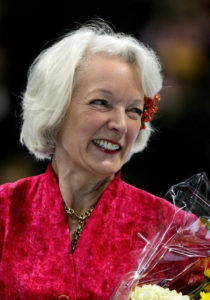 For more than a century, The Skating Club of Boston has nurtured the potential and dreams of young figure skaters. One of the most enduring and legendary is also one of the greatest figure skaters in the world as only a teenager: Tenley Albright.
For more than a century, The Skating Club of Boston has nurtured the potential and dreams of young figure skaters. One of the most enduring and legendary is also one of the greatest figure skaters in the world as only a teenager: Tenley Albright.
Tenley first stepped onto the Soldiers Field rink as a young girl who “dreamed of flying.” She would go on to light up the world stage. She was the first woman figure skater to win an Olympic gold medal and the first woman skater to win the sport’s “triple crown” by capturing the World, North American, and United States titles. In 2000, Sports Illustrated named her one of the “100 Greatest Female Athletes, and she was inducted into the National Women’s Hall of Fame in 2017.
And while Tenley’s Olympic gold medal performance made her a sensation, she knew that was only the beginning. She was only one of a handful of women at Harvard Medical School when she enrolled, making her yet another kind of pioneer. She was among the first wave of women to challenge cultural stereotypes and opportunities for women in medical careers – particularly in surgery.
“My success as a skater has always been balanced by my love of learning,” says Tenley. “I wanted to do my best on both the rink and in the classroom, and I hope I can inspire other young skaters to follow a similar path toward a full and rewarding life.”
Tenley was born on July 18, 1935, in Newton, Massachusetts. It was at six years old that Tenley received her first pair of skates, and to this day, she still remembers going to a local pond and reveling in the exhilarating freedom of skating and sailing around the open ice with the thrill of “jumping the cracks.” She began lessons at age eight, but those abruptly paused when, in 1946 at age 10, Tenley contracted polio and was hospitalized for several months. She could not move her leg, back or neck.
She would recover through hard work and visualization. “I would see what I wanted to do, and then do it,” she says. So she envisioned walking – one step, and then another. When she left the hospital in 1946, she returned to the rink with the same mindset. It was difficult, but then, she points out, skating is inherently humbling.
“If you are not falling down, you’re not trying something that is hard enough,” she says. “You learn disappointment comes with trying to be your best, and that’s a valuable life lesson.”
As Tenley regained her strength, she honed her natural talent. Four months after coming home from the hospital, she soared past more established skaters to win the Eastern Juvenile Skating Championship.
A string of championships would follow. In 1952, at age 16, she won the first of five consecutive U.S. women’s singles titles in figure skating — she was U.S. national champion from 1952–1956 – and she was North American champion in 1953 and 1955. She won her first Olympic medal, a silver, in 1952. She would also win the World Championship in 1953 and 1955; and a silver world medal in 1954.
In 1956, she was the first American woman skater to win a gold medal, but the competition, and the years of training, were thrown into jeopardy by a severe skating injury. Only two weeks before the Winter Olympics in Cortina d’Ampezzo, Italy, she cut her right ankle to the bone. The cut was stitched, and, still in great pain, Tenley delivered a faultless performance. Two weeks later, she took silver at the World Figure Skating Championships.
Tenley then went on to pursue another dream: becoming a doctor. She began medical training in 1957, one of only five women students, and graduated in 1961. She was in surgical practice for over 23 years and was a faculty member and lecturer at Harvard Medical School. Today she continues to stay closely connected to innovative ideas in science as founder & director of the MIT Collaborative Initiatives.
She acknowledges a debt of gratitude to our Brighton rink where her remarkable career began. And she looks forward to what our new Norwood facility makes possible, including inspiring a whole new generation of skaters. She especially appreciates that the new facility values a balanced commitment to skating and to academics. Doing well in school, as she herself has shown, enriches and expands a sense of self-fulfillment and achievement – no matter what one’s chosen profession.
Toward that end, she has made a generous gift to support the new Club library and academic center. The library serves as a student study center during the weekdays and as an all-purpose study and work center for students and adults alike during the evenings and weekends. Additional reinforcement comes with a part-time homeschool consultant.
“I loved skating from the moment I first put on skates,” she says, “and I poured myself into learning everything I could to excel at it. But I also know that it was one dream –it was one of many important goals in my life.”
Supporting the library and academic center is a natural gift, she says, “because the continued focus on my schoolwork made it possible for me to become a doctor – and that, in turn, opened doors to the world of science and discovery. So my advice to young skaters is: dream big, aim high, and work hard – and you’ll be surprised by how far you can go, both on the rink and well beyond.”